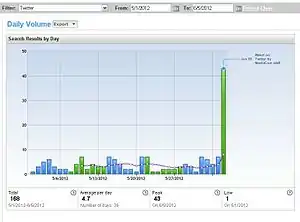Social media analytics
Social media analytics or Social media monitoring is the process of gathering and analyzing data from social networks. It is commonly used by marketers to track online conversations about products and companies. One author defined it as "the art and science of extracting valuable hidden insights from vast amounts of semi-structured and unstructured social media data to enable informed and insightful decision-making."[1]

Techniques
| Common use cases for social media analytics | Required business insight | Social media analytics techniques | Social media performance metrics |
|---|---|---|---|
| Social media audience segmentation | Which segments to target for acquisition, growth, or retention? Who are the advocates and influences for the brand or product? | Social network analysis | Active advocates, advocate influence |
| Social media information discovery | What are the new or emerging business-relevant topics or themes? Are new communities of influence emerging? | Natural language processing, complex event processing | Topic trends, sentiment ratio |
| Social media exposure & impact | What are the brand perceptions among constituents? How does the brand compare against competitors? Which social media channels are being used for discussion? | Social network analysis, natural language processing | Conversation reach, velocity, share of voice, audience engagement |
| Social media behavior inferences | What is the relationship between business-relevant topics and issues? What are the causes for expressed intent (buy, churn etc.)? | Natural language processing, clustering, data mining | Interests or preferences (theme), correlations, topic affinity matrices |
Impacts on business intelligence
Recent research on social media analytics has emphasized the need to adopt a business intelligence-based approach to collecting, analyzing, and interpreting social media data.[2][3] Social media presents a promising, albeit challenging, source of data for business intelligence. Customers voluntarily discuss products and companies, giving a real-time pulse of brand sentiment and adoption.[4] Social media is one of the most important tools for marketers in the rapidly evolving media landscape. Firms have created specialized positions to handle their social media marketing. These arguments are in line with the literature on social media marketing that suggests that social media activities are interrelated and influence each other.[5]
Moon and Iacobucci (2022)[6] focused on the marketing applications of social media analytics. Such applications include consumer behavior on social media, social media impact on firm performance, business strategy, product/brand management, social media network analysis, consumer privacy and data security on social media, and fictitious/biased content on social media. In particular, consumer privacy and data security are becoming more and more important in the social media universe given the increasing risk stemming from social media data breaches. In a similar vein, suspicious social media postings have significantly increased along with the growth of social media. Luca and Servas (2015)[7] reported that firms have a potential incentive to use fake postings when they have increased competition. Therefore, upgrading our ability to identify and monitor suspicious postings (e.g., fake reviews on Yelp) has become an important part of social media platform management.[8]
Muruganantham and Gandhi (2020) proposed a Multi-Criteria Decision Making (MCDM) model to prove that social media users' preferences, sentiments, behavior, and marketing data are related to social media analytics. Internet users are closely connected and show a high degree of mutual influence in social ideology and social networks, which in turn affects business intelligence. [9]
Role in international politics
The possibilities of the dangers of social media analytics and social media mining in the political arena were revealed in the late 2010s. In particular, the involvement of the data mining company Cambridge Analytica in the 2016 United States presidential election and Brexit have been representative cases that show the arising dangers of linking social media mining and politics. This has raised the question of data privacy for individuals and the legal boundaries to be created for data science companies in relevance to politics in the future. Both of the examples listed below demonstrate a future in which big data can change the game of international politics. It is likely politics and technology will evolve together throughout the next century. In the cases with Cambridge Analytica, the effects of social media analytics have resonated throughout the globe through two major world powers, the United States and the U.K.
2016 United States Presidential Election
The scandal that followed the American presidential election of 2016 was one involving a three-way relationship between Cambridge Analytica, the Trump campaign, and Facebook. Cambridge Analytica acquired the data of over 87 million[10] unaware Facebook users and analyzed the data for the benefit of the Trump campaign. By creating thousands of data points on 230 million U.S. adults, the data mining company had the potential to analyze which individuals could be swayed into voting for the Trump campaign, and then send messages or advertisements to said targets and influence user mindset. Specific target voters could then be exposed to pro-Trump messages without being aware, even, of the political influence settling on them. Such a specific form of targeting in which select individuals are introduced to an above-average amount of campaign advertisement is referred to as "micro-targeting."[11] There remains great controversy in measuring the amount of influence this micro-targeting had in the 2016 elections. The impact of micro-targeting ads and social media data analytics on politics is unclear as of the late 2010s, as a newly arising field of technology.
While this was a breach of user privacy, data mining, and targeted marketing undermined the public accountability to which social media entities are no longer subject, therefore twisting the democratic election system and allowing it to be dominated by platforms of “user-generated content [that] polarized the media’s message.”[12]
2020 United States Presidential Election Controversies
Analysis of Facebook political groups and postings by social media analytics firm, CounterAction, have shown the role of social media giants in protest movements such as attempts to overturn the 2020 United States presidential election and the 2021 United States Capitol attack.[13][14]

Brexit
During the 2016 Brexit referendum Cambridge Analytica attracted controversy for its use of data gathered from social media. A similar case took place in which a breach and Facebook data was acquired by Cambridge Analytica. There was concern that they had used the data to encourage British citizens to vote to leave the European Union in the 2016 EU referendum.[15] After a three-year investigation it was concluded in 2020 that there had been no involvement in the referendum.[16][15] Besides Cambridge Analytica, several other data companies such as AIQ[17] and the Cambridge University Psychometric Centre[18] were accused of, then investigated by the British government for their possible abuse of data to promote unlawful campaign techniques for Brexit.[19][20] The referendum ended with 51.89% of voters supporting the withdrawal of the United Kingdom from the European Union. This final decision impacted politics within the United Kingdom, and sent ripples across political and economic institutions worldwide.[21]
See also
References
- Sponder, Marshall; Khan, Gohar F. (2017). Digital analytics for marketing. New York, NY. ISBN 9781138190672. OCLC 975370877.
{{cite book}}: CS1 maint: location missing publisher (link) - Ruhi, Umar (2014). "Social Media Analytics as a Business Intelligence Practice:Current Landscape & Future Prospects". Journal of Internet Social Networking & Virtual Communities: 1–12. doi:10.5171/2014.920553. S2CID 167544401.
- Fan, W., & Gordon, M. D. (June 01, 2014). "The Power of Social Media Analytics". Association for Computing Machinery. Communications of the ACM, 57, 6, 74.
- Lu, Y., Wang, F., & Maciejewski, R. (January 01, 2014). "Business intelligence from social media: a study from the VAST Box Office Challenge". IEEE Computer Graphics and Applications, 34, 5.)
- Saboo, A. R., Kumar, V., & Ramani, G. (September 01, 2016). "Evaluating the impact of social media activities on human brand sales". International Journal of Research in Marketing, 33, 3, 524-541.
- Moon, Sangkil; Iacobucci, Dawn (February 28, 2022). "Social Media Analytics and Its Applications in Marketing". Foundations and Trends in Marketing. 15 (4): 213–292. doi:10.1561/1700000073. ISSN 1555-0753. S2CID 247201448.
- Luca, Michael; Zervas, Georgios (December 1, 2016). "Fake It Till You Make It: Reputation, Competition, and Yelp Review Fraud". Management Science. 62 (12): 3412–3427. doi:10.1287/mnsc.2015.2304. ISSN 0025-1909.
- Moon, Sangkil; Kim, Moon-Yong; Bergey, Paul K. (September 1, 2019). "Estimating deception in consumer reviews based on extreme terms: Comparison analysis of open vs. closed hotel reservation platforms". Journal of Business Research. 102: 83–96. doi:10.1016/j.jbusres.2019.05.016. ISSN 0148-2963. S2CID 181482746.
- Muruganantham A.; Gandhi, G. Meera (February 1, 2020). "Framework for Social Media Analytics based on Multi-Criteria Decision Making (MCDM) model". Multimedia Tools and Applications. 79 (5): 3913–3927. doi:10.1007/s11042-019-7470-2. ISSN 1573-7721. S2CID 254869748.
- Hanna, Mina; Isaak, Jim (August 14, 2018). "User Data Privacy: Facebook, Cambridge Analytica, and Privacy Protection". IEEE. 51 (8): 56–59. doi:10.1109/MC.2018.3191268. S2CID 52047339.
- Tarran, Brian (May 29, 2018). "What can we learn from the Facebook—Cambridge Analytica scandal?". Significance. 15 (3): 4–5. doi:10.1111/j.1740-9713.2018.01139.x.
- Santos, Tiago; Louçã, and Helder Coelho, Jorge; Coelho, Helder (February 19, 2020). "The Digital Transformation of the Public Sphere". Systems Research and Behavioral Science. 36 (6): 778. doi:10.1002/sres.2644. S2CID 210550036.
- Craig Silverman, Craig Timberg, Jeff Kao, and Jeremy B. Merrill. (4 January 2022). "Facebook Hosted Surge of Misinformation and Insurrection Threats in Months Leading Up to January. 6 Attack, Records Show". Defense One website Retrieved 8 January 2021.
- Craig Timberg, Elizabeth Dwoskin, and Reed Albergotti. (22 October 2021). "Inside Facebook, January. 6 violence fueled anger, regret over missed warning signs". Washington Post website Retrieved 8 January 2022.
- "Cambridge Analytica 'not involved' in Brexit referendum, says watchdog". BBC News. October 7, 2020. Retrieved June 13, 2022.
- "Cambridge Analytica did not misuse data in EU referendum, says watchdog". the Guardian. October 7, 2020. Retrieved June 13, 2022.
- "AggregateIQ Created Cambridge Analytica's Election Software, and Here's the Proof". Gizmodo. March 26, 2018. Retrieved June 13, 2022.
- Investigation Commissioners Office (November 6, 2018). "Investigation into the use of data analytics in political campaigns" (PDF): 116.
{{cite journal}}: Cite journal requires|journal=(help) - "Facebook suspends Canadian firm AggregateIQ over data scandal". CNBC. April 7, 2018. Retrieved June 13, 2022.
- "Data firm broke Canadian privacy laws with involvement in Brexit, U.S. campaigns - probe". Reuters. November 26, 2019. Retrieved June 13, 2022.
- "Results and turnout at the EU referendum". www.electoralcommission.org.uk. September 25, 2019. Retrieved October 23, 2022.